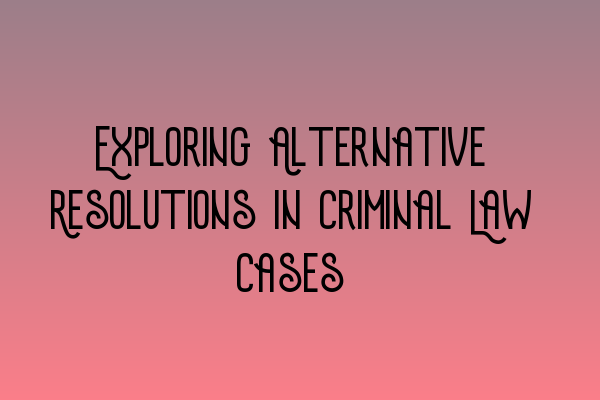Exploring Alternative Resolutions in Criminal Law Cases
At SQE Criminal Law & Practice Law UK, we understand that not all criminal law cases need to go to trial. In fact, there are often alternative resolutions that can be explored, providing a more efficient and cost-effective solution for all parties involved. In this blog post, we will dive into the different alternative resolutions available in criminal law cases and why they should be considered.
The Benefits of Alternative Resolutions
Before we delve into specific alternative resolutions, let’s take a moment to understand why they are worth considering. Alternative resolutions offer several benefits:
- Time and Cost Savings: Going to trial can be a lengthy and expensive process. Alternative resolutions can help both parties save time and money.
- Reduced Emotional Impact: The adversarial nature of a trial can take a toll on victims, witnesses, and defendants. Alternative resolutions allow for a more cooperative approach, potentially reducing emotional stress.
- Potential for Rehabilitation: In some cases, alternative resolutions can provide an opportunity for the defendant to address underlying issues and seek rehabilitation, leading to a more positive outcome in the long run.
Exploring Alternative Resolutions
Now let’s look at some of the alternative resolutions commonly used in criminal law cases:
1. Plea Bargaining
Plea bargaining involves negotiations between the prosecution and the defense, where the defendant agrees to plead guilty in exchange for a reduced sentence or a lesser charge. This resolution can save time and resources, and it often leads to a more predictable outcome.
2. Diversion Programs
Diversion programs are alternatives to traditional prosecutions, primarily used for non-violent offenders. These programs focus on rehabilitation rather than punishment, providing support and intervention to address the underlying issues that contributed to the criminal behavior. Successful completion of a diversion program can lead to charges being dropped or reduced.
3. Restorative Justice
Restorative justice aims to bring together the victim, the offender, and the community in a process where all parties can communicate, address harm, and work towards a resolution. This approach emphasizes repairing the harm caused by the offense and promoting healing and understanding.
When to Explore Alternative Resolutions
Not all cases are suitable for alternative resolutions. The decision to explore alternative resolutions should be based on various factors, such as the specific circumstances of the case, the strength of the evidence, and the wishes of the victim. Additionally, the involvement of experienced legal professionals is crucial to ensure that the rights and interests of all parties are protected.
Contact SQE Criminal Law & Practice Law UK
If you are involved in a criminal law case and are considering alternative resolutions, it is essential to seek expert legal advice. At SQE Criminal Law & Practice Law UK, our team of experienced solicitors can provide guidance and support throughout the process. Contact us today to schedule a consultation.
